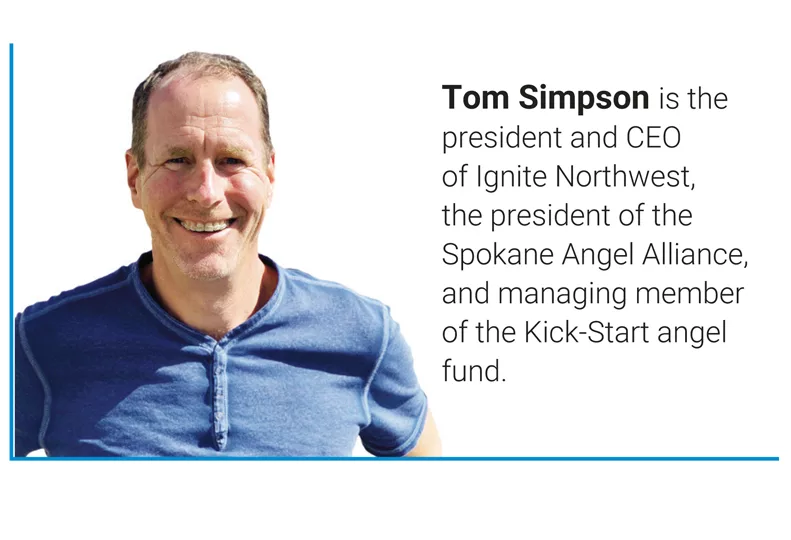Sparks Weekend promotes startup collaboration
New fund-sharing app for college meal plans wins top prize at event

Collaboration between entrepreneurs, businesses, universities, and government agencies is fundamental to creating and attracting startup companies. Prioritizing the formation of new businesses is essential to economic growth as startups account for the vast majority of new jobs.
A recent example of entrepreneurial collaboration in Spokane was Sparks Weekend, which was held April 29 through May 1. The three-day event brought innovators together with mentors and those aspiring to join a new business for the purpose of creating startups in our region. Spokane-based Spiceology Inc., for example, which is the fastest-growing spice company in the nation, is a product of the predecessor to Sparks Weekend, previously called Startup Weekend.
The weekend kicked off on Friday evening with a keynote address titled “Life in a Startup—What to Expect,” by Darby McLean, who is vice president of operations with Spiceology and is closely involved with entrepreneurial programs both at Eastern Washington University and at Gonzaga University.
Following Darby’s whimsical address, 30 innovators, all who had pre-registered to present, lined up to give 60-second elevator pitches highlighting their new business ideas. The audience was so inspired that eight other attendees spontaneously took the stage and provided their own impromptu pitches. Over 125 people attended, and the audience included business leaders, representatives from local universities and colleges, angel investors, and other entrepreneurs.
Some people attended just to watch the Shark Tank-like action. Although Sparks Weekend is intended to be a more entrepreneur-friendly event than Shark Tank, several participants at the predecessor to Sparks Weekend have subsequently been invited to Shark Tank, including the founders of Spiceology and iCPooch.
The ideas were electronically voted on by all participants and the top 10 vote-getters moved on to recruit teams of developers, engineers, designers, marketers, and finance professionals.
The top 10 ideas were:
•Afterlite Redaction—A body cam redaction service for law enforement.
•CloudJamz—A wireless guitar app.
•Gameleon Boards—An all-in-one game board including cornhole and beer pong.
•GigScore—An app for gig workers to earn credit ratings and obtain loans.
•Keso—A charcuterie restaurant.
•Silgen—A small, portable, and quiet generator.
•Solar Blades—A solar panel cleaning product and service.
•Teach Suite—A single platform aggregating several software products used by teachers.
•Tinkerspot—An electronics kit for engineering students and teachers.
•Zaps—A fund-sharing app for college campus meal plans.
On Saturday and Sunday, mentors guided teams to prove their business concept, develop a minimum viable product, and even sign up initial customers. Mentors included: Jordan Allen, CEO of Doorsey Inc.; Andy Barrett, founder of Toolbox; Jason Boudreau, CEO of Drive509; Amanda Hepper, co-founder of Medcurity Inc.; Nancy Janzen, CEO of StaffReady and Maplewood Software Inc.; Andy Johnston, CEO of Johnston Engineering PLLC; John Munro, former CEO of Chargeback; Mark Russell, CEO of HyperSciences Inc.; Jordan Tampien, co-founder of 4Degrees Real Estate; and Joy Tang, CEO of Mai.
The 10 teams worked diligently all weekend refining their business plans and developing final presentations.
On Sunday evening, the teams presented to a panel of judges with the aspiration of winning first place and being eligible for $50,000 in investment capital provided by local angel investors—and subject to final due diligence and agreement on terms.
Each team was allowed five minutes to present plus five minutes of questions and answers. All participants were invited to hear the final presentations. Judges included: Richard Denenny, president of Lee & Hayes PC; Mark Gustafson, CEO of Avista Edge Inc.; Rob Martinson, founder of Limelyte Technology Group Inc.; Chip Overstreet, CEO of Spiceology; and Lisa Shaffer, founder of PawPrint Genetics.
The winners were:
•First place—Zaps.
•Second place—Gameleon.
•Third place and crowd favorite—GigScore.
The core of the Zaps team are three Gonzaga University students—Hayley Mosby, Siena Merrin, and Kate Sprague. The team is excited to get started, sign up a beta customer (Gonzaga University?), and develop the Zaps app.
Organizers of the event included representatives of Limelyte Technology Group, Tribe Media Lab SPC, and Ignite, in addition to Clay Cerna, of Sweetbox Delivery; Doug Forkner, of Avista Corp.; Adam Parish, of Atomic; Mark Pond, of Spokane Public Library; Jonathan Scheidegger, of Spiceology; and June Swatzell, of OrganicNearby. In addition to the mentors, judges, angel investors, and organizers, collaborators on Sparks Weekend included over 15 venue, financial, and food-and-beverage sponsors.
Sparks Weekend 2022 will result in the formation of new startups. In addition to Zaps, at least three other teams have already scheduled meetings with angel investors. The next Sparks Weekend will be held in November 2023.
In total, over 40 local companies and individuals collaborated to make Sparks Weekend happen. Community collaboration is highly effective for achieving goals and effecting change. Sparks Weekend is just one example. There are several other examples in Spokane where collaboration has positively impacted our community. Where would Spokane be, for example, without Expo ’74.
Like this story?
You’ll love the rest. Subscribe today, and you’ll receive a year’s subscription to the Journal of Business, unlimited access to this website, daily business news emails, and weekly industry-specific
e-newsletters. Click here for 50% off your first year.
Related Articles

_c.webp?t=1763626051)
_web.webp?t=1764835652)

